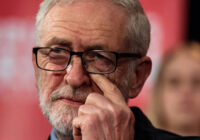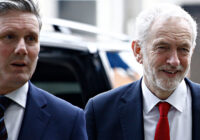Anti-Semitism is dangerous because of what it reveals about people and systems, not just in and of itself.
In 2010, a British journalist born in Poland, Ewa Jasiewicz, spray-painted the words, “Free Gaza and Palestine” on part of the wall of the old Warsaw Ghetto, together with Yonatan Shapira, a former captain in the Israel Defense Forces. She has since apologized for her “lack of awareness” and the pain she caused the survivors of the Holocaust and their families — some 300,000 people lost their lives 75 years ago, after an uprising in April 1943. However, Jasiewicz insists that this was not a Warsaw Ghetto memorial but a “pre-existing and regularly used site of free expression and artwork in the territory of the old ghetto which covers a substantial area of the city of Warsaw.”
Nonetheless, it is hard to believe that she did not know that the wall had historical significance. Despite being involved in anti-racist and anti-fascist activism, this is not the only time Jasiewicz has been accused of being “insensitive” in her struggle to stop the suffering and death caused by the Israeli occupation of the Palestinian territories.
The scandal has re-emerged now, eight years later, because Jasiewicz was invited to speak alongside UK Labour Party leader Jeremy Corbyn and others at a “fringe festival” organized by Momentum, a left-wing organization affiliated with Labour. (She has since withdrawn from the event.) In an attempt to discredit Corbyn as an anti-Semite, The Times warned that “Warsaw ghetto vandal to speak at Momentum’s Corbyn festival.” This was followed by articles in populist tabloids such as The Sun and The Daily Mail, describing Corbyn’s support for an activist who “desecrated the last remaining walls of the Warsaw ghetto” accompanied by a photograph of Jasiewicz wearing a Palestinian kaffiyeh.
None of Jasiewicz’s actions have been anti-Semitic as the term is defined by the International Holocaust Remembrance Alliance. But the slur is effective. There is a strong and well-merited consensus in our society that you cannot be both a good person and an anti-Semite. Corbyn’s opponents presume that demonstrating his anti-Semitism is the same as proving him unfit for British politics. Corbyn and Jasiewicz both refuse to admit that they are anti-Semitic, clarifying that they oppose the Israeli occupation and are not hostile to Jews in general.
According to their argument, criticizing Israeli policy is no more anti-Semitic than criticizing Theresa May is anti-British. But anti-Semitism is dangerous because of what it reveals about people and systems, not just in and of itself, and in this instance it is those who have been the quickest to throw stones who are perhaps most guilty.
Anti-Semitism is a problem because it is a way of perceiving reality that structures the way adherents engage the world. It operates with simplistic, black-and-white categories, sees connections between people and events that are not really there, and encourages knee-jerk reactions that involve scapegoating and unequivocal condemnation. The term “anti-Semitism” was popularized in 1881 by a German politician named Wilhelm Marr, who fought to exclude Jews from German social, economic and political life. The implication was that there are such people as “Semites” who pursue particular agendas that are detrimental to the rest of the world.
Today, scholars talk about “antisemitism,” removing the hyphen to minimalize the sinister aspersions embedded within Marr’s term. Anti-Semitism assumes that nations exist and that individuals can represent whole groups of people they have never met and have little in common with — such that all Jewish people can be considered guilty because of the wrong actions of a handful of individual Jews. At the same time, it employs a double standard and refuses to accept responsibility for crimes committed by members of its own group, such as the horrors of British colonialism or the dependence of contemporary capitalism on modern-day slavery.
It assumes the worst of people and stereotypes entire groups as exhibiting negative character traits. It justifies or minimizes the importance of excluding, persecuting and even murdering people just because they are associated with one group or another. It focuses on one group or country (such as Netanyahu’s Israel) as being particularly blameworthy to the exclusion of other, equally culpable parties (such as Assad’s Syria). And, through its monolithic outlook, it marginalizes the contributions of individuals and groups to collaborative endeavors, such as by ignoring the Jewish elements in Christianity or by focusing exclusively on British activists such as Jasiewicz and ignoring her Jewish accomplice.
Jeremy Corbyn may indeed be an anti-Semite, but before we start trying to remove the speck from his eye, we need to think about what the term means, and make sure that we do not embody the very problems we are seeking to solve in the world.
*[The Centre for Analysis of the Radical Right is a partner institution of Fair Observer.]
The views expressed in this article are the author’s own and do not necessarily reflect Fair Observer’s editorial policy.
Support Fair Observer
We rely on your support for our independence, diversity and quality.
For more than 10 years, Fair Observer has been free, fair and independent. No billionaire owns us, no advertisers control us. We are a reader-supported nonprofit. Unlike many other publications, we keep our content free for readers regardless of where they live or whether they can afford to pay. We have no paywalls and no ads.
In the post-truth era of fake news, echo chambers and filter bubbles, we publish a plurality of perspectives from around the world. Anyone can publish with us, but everyone goes through a rigorous editorial process. So, you get fact-checked, well-reasoned content instead of noise.
We publish 2,500+ voices from 90+ countries. We also conduct education and training programs
on subjects ranging from digital media and journalism to writing and critical thinking. This
doesn’t come cheap. Servers, editors, trainers and web developers cost
money.
Please consider supporting us on a regular basis as a recurring donor or a
sustaining member.
Will you support FO’s journalism?
We rely on your support for our independence, diversity and quality.








